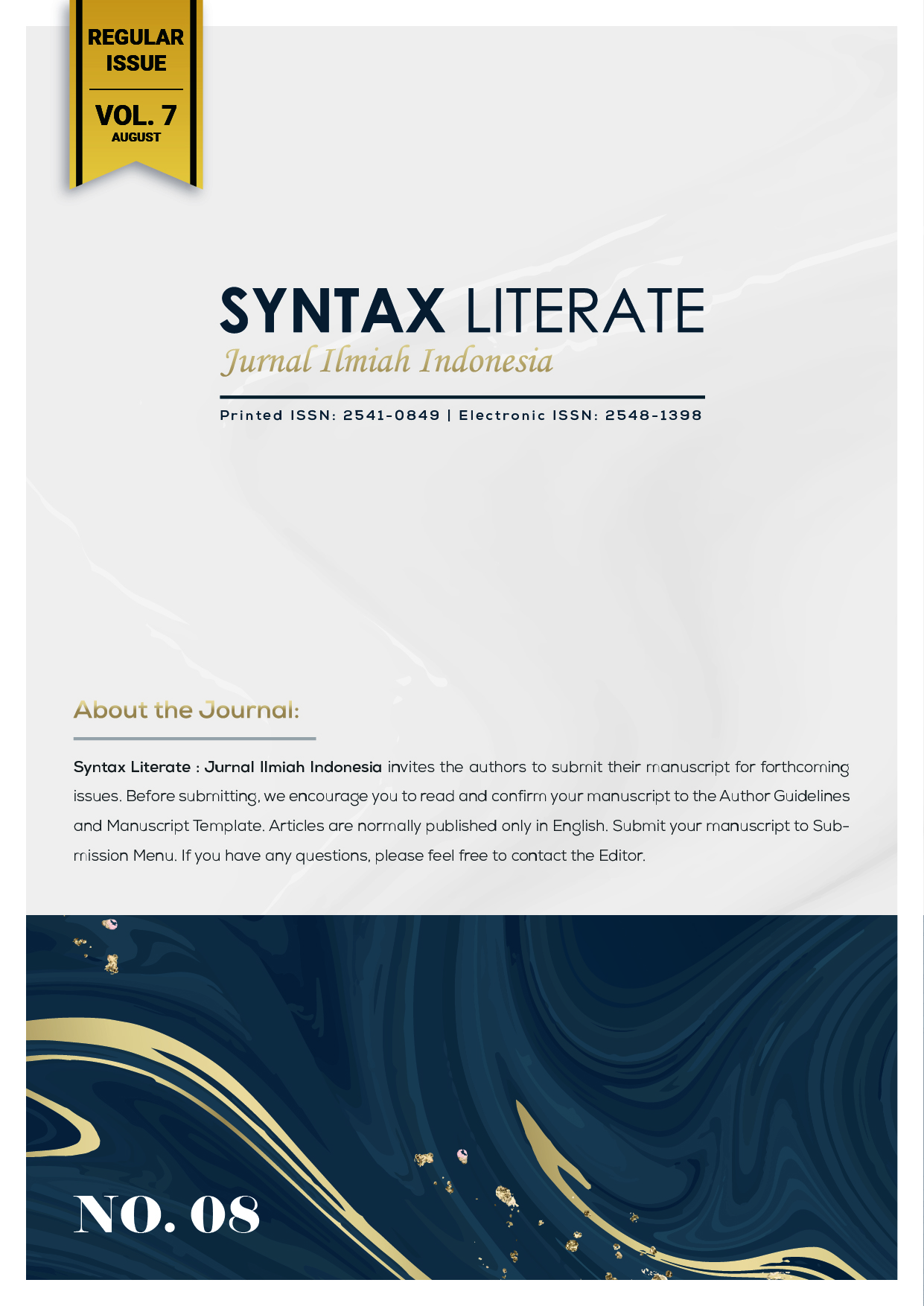Developing Lesson Plan For Blended Interactive Teaching Descriptive Text at Seventh Graders
Abstract
This article examined the lesson plan's poor quality, which hinders language learning because it's only an administrative necessity. The study team set goals. Recognising and designing a lesson plan. This study used the three-stage R&D model of feasibility (need analysis), product development, and validation. Qualitative data analysis improves comprehension, comparison, and interpretation. Comparing questionnaire results led to study conclusions.The study found that students' learning styles have never been used to build effective teaching and learning tactics. Researchers use project-based, social-family, and student-centered learning. The results show that the researchers only employ 16 of the 20 characteristics to develop the lesson plan. Facilitators should also promote student-centered and project-based learning.
Downloads
References
Anaktototy, K., Que, S. R., & Lewier, C. A. (2020). English Teachers’ Expertise In Designing And Implementing Lesson Plan For Curriculum 2013. 5(2), 60– 68. https://doi.org/10.22216/jcc.2020.v5i2.4522
Andini, S., Budiyono, & Fitriana, L. (2018). Developing flipbook multimedia: The achievement of informal deductive thinking level. Journal on Mathematics Education, 9(2), 227–238. https://doi.org/10.22342/jme.9.2.5396.227-238
Apriani, E., Supardan, D., & Umami, M. (2020). Independent learning: English teachers’ problems in designing a good lesson plan in new normal era at MAN Rejang Lebong. In International Conference on the Teaching English and Literature. 1(1), 72-78.
Arrasyid, F. I. (2021). The Needs of Developing English Teacher’s Professional Competence In the 21st Century. International Journal of Education and Humanities (IJEH), 1(2).
Emzir, 2013. Metodologi Penelitian Pendidikan. Depok: PT. Raja Grafindo Persada.
Gall, M. D., Gall, J. P., & Borg, W. R. (2003). Educational Research: An Introduction (8th Edition). New York: Longman.
Herbein, E., Golle, J., Tibus, M., Schiefer, J., Trautwein, U., & Zettler, I. (2018). Fostering elementary school children's public speaking skills: A randomized controlled trial. Learning and Instruction, 55, 158-168.
Hughes, R., (2009). Teaching and researching speaking. Pearson Longman.
Iman, J. N. (2017). Debate instruction in EFL classroom: Impacts on the critical thinking and speaking skill. International Journal of Instruction, 10(4), 87–108. https://doi.org/10.12973/iji.2017.1046a
Iqbal, M. H., Siddiqie, S. A., & Mazid, M. A. (2021). Rethinking theories of lesson plan for effective teaching and learning. Social Sciences & Humanities Open, 4(1), 100172. https://doi.org/10.1016/j.ssaho.2021.100172
Lalima, D., & Dangwal, K. L. (2017). Blended learning: An innovative approach. Universal Journal of Educational Research, 5(1), 129-136.
Louma, S. (2004). Assessing speaking (Cambridge language assessment). Cambridge: Cambridge University Press. https://doi.org/10.1017/CBO9780511733017
Menggo, S., Suastra, I., Budiarsa, M., & Padmadewi, N. N. (2019). Needs analysis of academic-English speaking material in promoting 21st century skills. International Journal of Instruction, 12(2), 739-754.
Munir. (2013). Multimedia pembelajaran. Bandung: Alfabeta.
Nashruddin, W. (2020). Integrating undergraduate research and inquiry in English language teacher education programs in Indonesia: A case study (Doctoral dissertation, Charles Darwin University (Australia).
Nordgren, K., Kristiansson, M., Liljekvist, Y., & Bergh, D. (2021). Collegial collaboration when planning and preparing lessons: A large-scale study exploring the conditions and infrastructure for teachers’ professional development. Teaching and Teacher Education, 108. https://doi.org/10.1016/j.tate.2021.103513
Nurfitri, N., Regina, R., & Yulian, R. (2020) English teachers difficulties in designing lesson plan based on Indonesian 2013 curriculum. Journal of English Language Teaching Innovations and Materials (Jeltim), 2(2), 85-96. http://dx.doi.org/10.26418/jeltim.v2i2.39078
Nurtanto, M., Kholifah, N., Masek, A., Sudira, P., & Samsudin, A. (2021). Crucial problems in arranged the lesson plan of vocational teacher. International Journal of Evaluation and Research in Education, 10(1), 345-354.
Purwani, W. A, (2021) The development of lesson plan using blended learning model at the university of Billfath, Teaching of English Language and Literature Journal, 9(2) https://dx.doi.org/10.30651/tell.v9i2.9400
Raynesa Noor Emiliasari. (2019). Lesson planning in efl classroom: a case study in lesson plan preparation and implementation. Wiralodra English Journal, 3(2), 367–375. https://doi.org/10.31943/wej.v3i2.67
Richey, Rita & Nelson. 1996. Developmental research. in jonassen (ed). hand book of research for educational communicational and technology. New York: McMillan Publishing Company
Wilga, M, Rivers. (1988). Interactive language teaching. (Ed.). New York: Cambridge University Press, 1987. Pp. xvi 228. Applied Psycholinguistics, 9(3), 299-302. https://doi.org/10.1017/S014271640000789X
Yavani, Z., & Anani, N. (2018). The effectiveness of poster vs video in speaking skill of EFL learners. English Education: Jurnal Tadris Bahasa Inggris, 11(1), 133-147.
Zainil, M., & Fauzan, A. (2020). Developing a lesson plan of elchotectim model based on blended learning for teaching mathematics at primary schools. In 2nd International Conference Innovation in Education (ICoIE 2020) (pp. 111-116). Atlantis Press. https://dx.doi.org/10.2991/assehr.k.201209.202
Copyright (c) 2022 Fahmi Al Fiqri, Farouk Imam Arrasyid, Zakky Yavani

This work is licensed under a Creative Commons Attribution-ShareAlike 4.0 International License.











